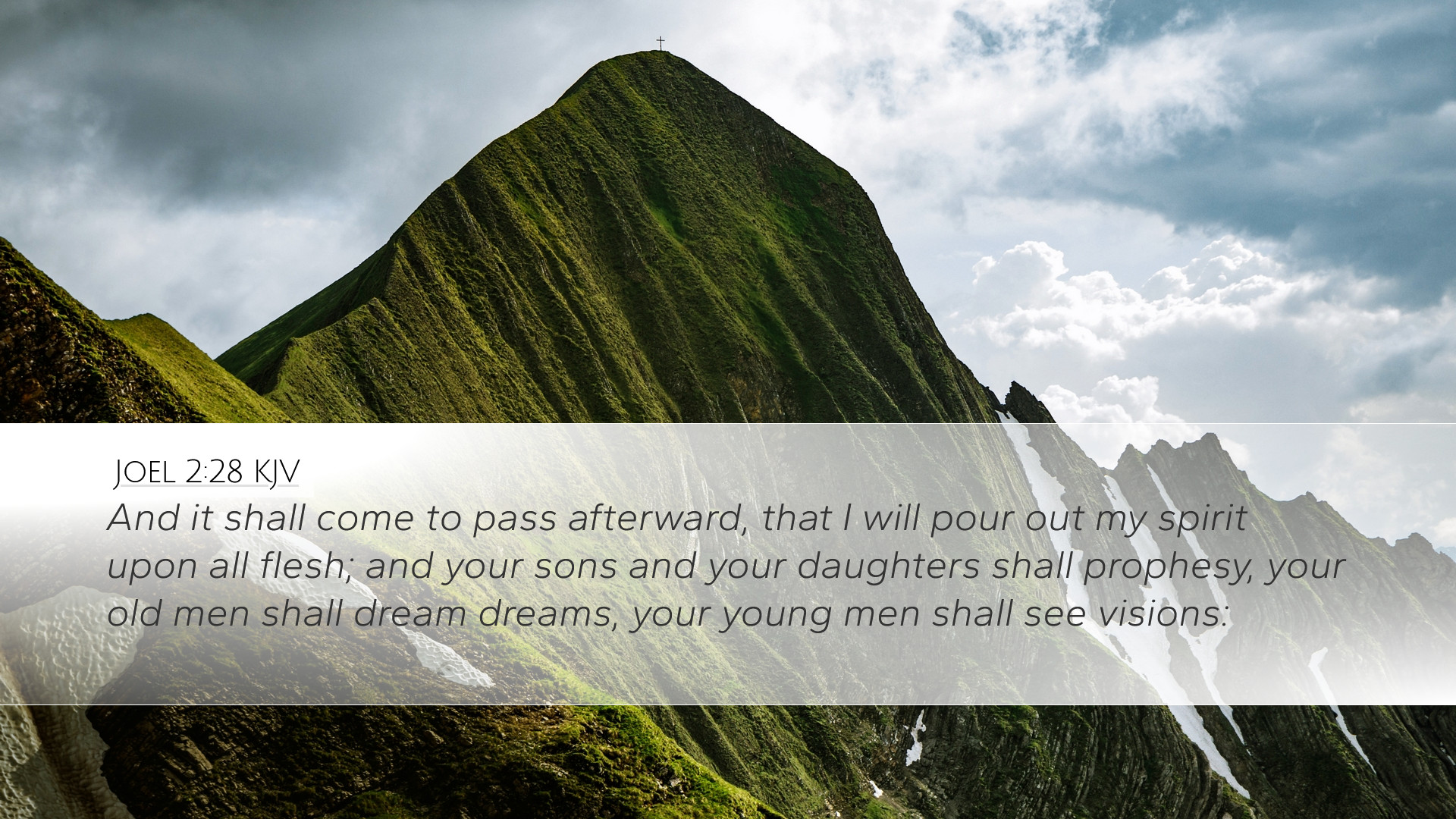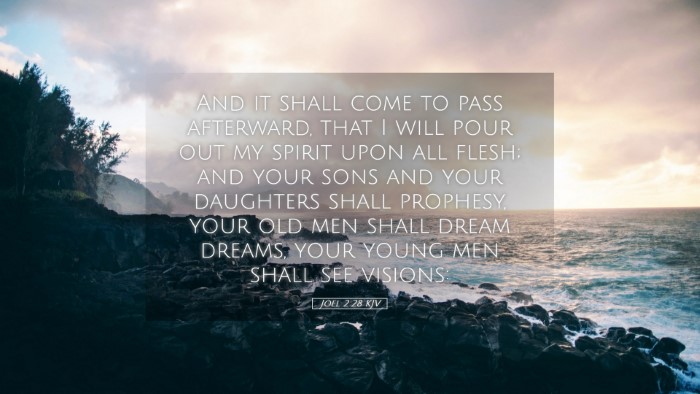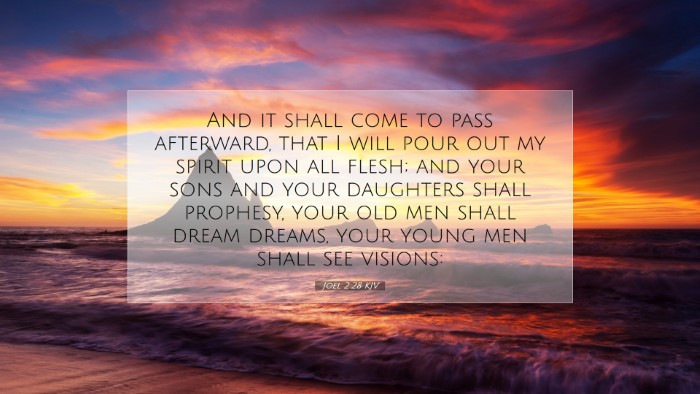Commentary on Joel 2:28
The prophecy of Joel 2:28 holds significant theological and eschatological implications, foretelling a time of divine outpouring of the Spirit. This pivotal verse states: "And it shall come to pass afterward, that I will pour out my Spirit on all flesh; your sons and your daughters shall prophesy, your old men shall dream dreams, and your young men shall see visions." This commentary synthesizes insights from several public domain sources, aiming to provide verse-specific understanding valuable to pastors, students, theologians, and scholars.
The Outpouring of the Spirit
Spiritual Promises in Context: The commencement of this passage speaks to the aftermath of a great calamity, highlighting a restoration and renewal in the relationship between God and His people. Matthew Henry emphasizes that this outpouring signifies not merely a physical renewal but a profound spiritual awakening, marking a transformative moment in God's redemptive history.
The Nature of the Outpouring: Albert Barnes elaborates on the phrase "pour out my Spirit," indicating an abundance and generosity in God's Spirit given to humankind, which embodies His grace and mercy. This is not a scarce or reserved blessing but a lavish gifting intended for all people.
Inclusive Promise
All Flesh: The phrase "on all flesh" signifies inclusivity in God’s promises for all humanity, transcending prior societal barriers. Adam Clarke articulates that this could be directed towards both Jews and Gentiles, indicating that the reach of God's Spirit will extend across ethnic and social divisions. This radical inclusivity marks a shift from earlier dispensations, where prophecies and divine visitation were primarily for select individuals.
Generational Significance
Sons and Daughters: The mention of "your sons and your daughters" positions the role of women and youth positively within the community of faith. Matthew Henry notes that both men and women are empowered to prophesy, illustrating a significant change in the societal roles of women in the Old Testament context, where they were often sidelined in prophetic ministry.
Young and Old: Additionally, the mention of "young men" seeing visions and "old men" dreaming dreams reveals that God’s communication will not be limited by age. Adam Clarke comments that this indicates a fellowship of vision across generations, strengthening the community through shared revelations from God, thereby emphasizing the value and contributions of all ages in the life of the Church.
The Prophetic Nature of the Outpouring
Function of Prophecy: The prophetic empowerment described in this passage serves as an essential tool for discerning the divine will and responding to it. Barnes notes the critical role of prophecy in guiding the people towards a deeper relationship with God and providing insight into His plans.
Visions and Dreams: Dreams and visions symbolize divine revelation and guidance that go beyond mere human understanding. Matthew Henry points out this dual avenue through which God manifests His word, conveying truths that can alter the course of history and individual lives alike.
New Covenant Fulfillment
Connection to the New Testament: This prophecy experiences its initial fulfillment in Acts 2 during the Pentecost event, where the Holy Spirit was poured out upon the disciples. Albert Barnes presents this as the inauguration of the New Covenant, where the promise of the Spirit becomes a tangible reality for all believers, not just a select few.
Overarching Theme of Restoration: Joel's prophecy is inexorably linked to the themes of repentance and return. As God pours out His Spirit, it serves as an affirmation of His unfailing love and restoration of His people, opening the door to a renewed covenantal relationship. The act of pouring out reflects God's readiness to forgive and restore, which is foundational to biblical theology.
Practical Applications for Today
Empowerment for Ministry: The continued relevance of Joel 2:28 for modern Christians is apparent. Pastors and leaders are encouraged to recognize this divine empowerment as a basis for engaging in ministries that transcend traditional barriers. The Church is called to embrace a diverse body of believers fueled by the Spirit.
Promoting Intergenerational Relationships: The passage calls for an appreciation of the voices of all generations within the Church. It urges current church leaders to mentor and include younger members, just as the insights and wisdom of older generations should be cherished and made accessible.
Awakening to Prophetic Voices: Believers today should be encouraged to expect and seek out divine encounters. The promise of visions and dreams invites congregants to engage actively with God, anticipating that His Spirit will illuminate paths of service, revelation, and communal action.
Conclusion
In summary, Joel 2:28 encapsulates a powerful promise of divine engagement with humanity through the outpouring of the Spirit. Understanding this text through the lenses of public domain commentaries reveals its depth and relevance, affirming its place within the broader narrative of redemption in Scripture. As congregations reflect on this promise, they are invited into a dynamic relationship with God, actively participating in His redemptive work in the world.


